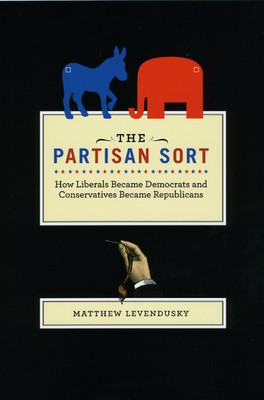
- We will send in 10–14 business days.
- Author: Matthew Levendusky
- Publisher: University of Chicago Press
- ISBN-10: 0226473651
- ISBN-13: 9780226473659
- Format: 15 x 22.6 x 1.3 cm, softcover
- Language: English
- SAVE -10% with code: EXTRA
Reviews
Description
As Washington elites drifted toward ideological poles over the past few decades, did ordinary Americans follow their lead? In The Partisan Sort, Matthew Levendusky reveals that we have responded to this trend--but not, for the most part, by becoming more extreme ourselves. While polarization has filtered down to a small minority of voters, it also has had the more significant effect of reconfiguring the way we sort ourselves into political parties.
In a marked realignment since the 1970s--when partisan affiliation did not depend on ideology and both major parties had strong liberal and conservative factions--liberals today overwhelmingly identify with Democrats, as conservatives do with Republicans. This "sorting," Levendusky contends, results directly from the increasingly polarized terms in which political leaders define their parties. Exploring its far-reaching implications for the American political landscape, he demonstrates that sorting makes voters more loyally partisan, allowing campaigns to focus more attention on mobilizing committed supporters. Ultimately, Levendusky concludes, this new link between party and ideology represents a sea change in American politics.
EXTRA 10 % discount with code: EXTRA
The promotion ends in 17d.13:07:28
The discount code is valid when purchasing from 10 €. Discounts do not stack.
- Author: Matthew Levendusky
- Publisher: University of Chicago Press
- ISBN-10: 0226473651
- ISBN-13: 9780226473659
- Format: 15 x 22.6 x 1.3 cm, softcover
- Language: English English
As Washington elites drifted toward ideological poles over the past few decades, did ordinary Americans follow their lead? In The Partisan Sort, Matthew Levendusky reveals that we have responded to this trend--but not, for the most part, by becoming more extreme ourselves. While polarization has filtered down to a small minority of voters, it also has had the more significant effect of reconfiguring the way we sort ourselves into political parties.
In a marked realignment since the 1970s--when partisan affiliation did not depend on ideology and both major parties had strong liberal and conservative factions--liberals today overwhelmingly identify with Democrats, as conservatives do with Republicans. This "sorting," Levendusky contends, results directly from the increasingly polarized terms in which political leaders define their parties. Exploring its far-reaching implications for the American political landscape, he demonstrates that sorting makes voters more loyally partisan, allowing campaigns to focus more attention on mobilizing committed supporters. Ultimately, Levendusky concludes, this new link between party and ideology represents a sea change in American politics.


Reviews